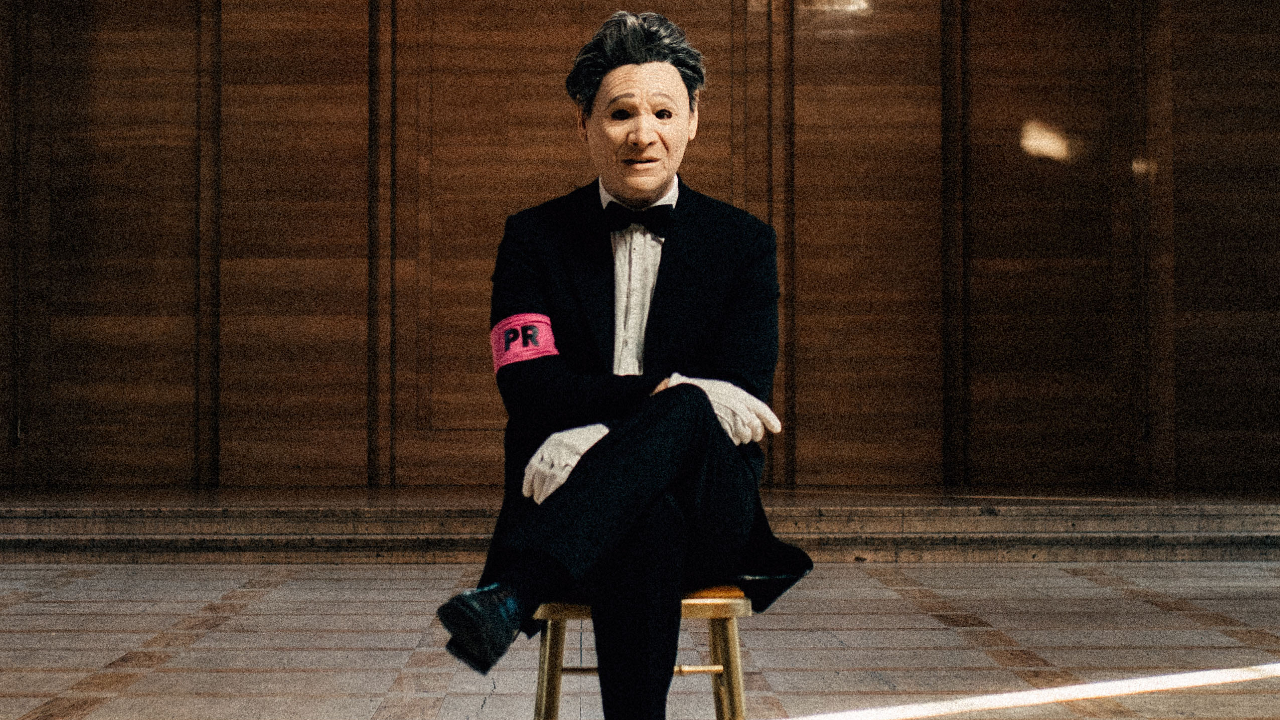Amon Amarth: Could they be the next Iron Maiden?
Could a Swedish band singing about Vikings really become heavy metal legends? Amon Amarth might just have what it takes...
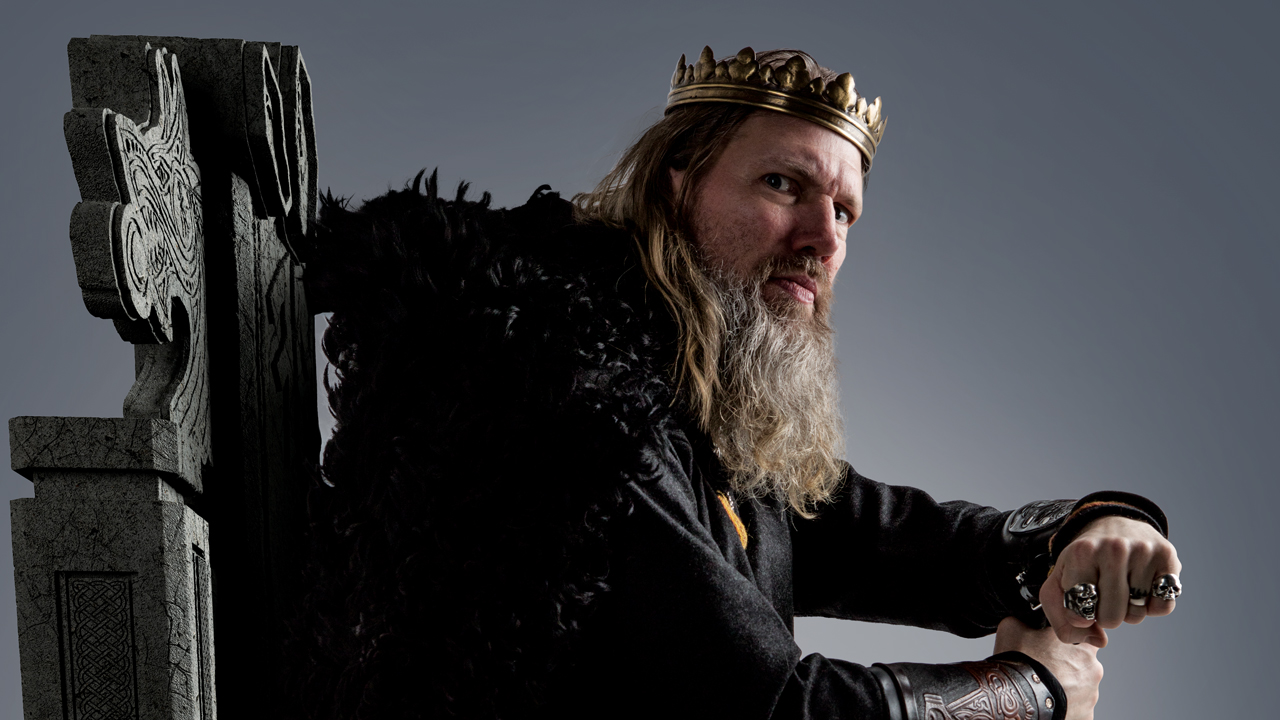
THUNK! There’s something satisfying about launching an axe from your hand, then watching it pivot through the air with a surprising grace and embed itself deep in a wooden target 15 feet away.
THUNK! It’s a feeling that dates back millennia, ever since humans worked out how to turn tools into weapons: primeval, aggressive, but weirdly noble.
CLANG! That’s the sound an axe makes when it doesn’t do what it’s supposed to do, bouncing off the wooden boards and clattering to the floor. Today, that particular sound is followed by a loudly grumbled, Scandinavian-accented, “Shit. This is not a good day. I’m normally better than this.”
The source of the expletive is Johan Hegg, Amon Amarth frontman, Viking metal poster boy and, if advanced hype is anything to go by, axe-hurler of some repute.
Johan and Hammer have convened, hatchet-handed, under some railway arches a few hundred metres south of the Thames in central London.
Our hosts are Whistle Punks, an “urban axe-throwing club” that allows the public – and six-foot-five metal singers with weaponised facial hair – to take out the day’s frustrations by lobbing gleaming choppers at increasingly battered targets.
For the next 60 minutes, a grand battle royale will take place between Sweden’s
finest horn-raising, mead-swilling Asgardian and Hammer’s weaselly, laptop-bothering, decidedly non-heroic writer. It won’t be elegant, it won’t be pretty, and it may involve loss of limbs.
Sign up below to get the latest from Metal Hammer, plus exclusive special offers, direct to your inbox!
Gentlemen, let’s start our axes…
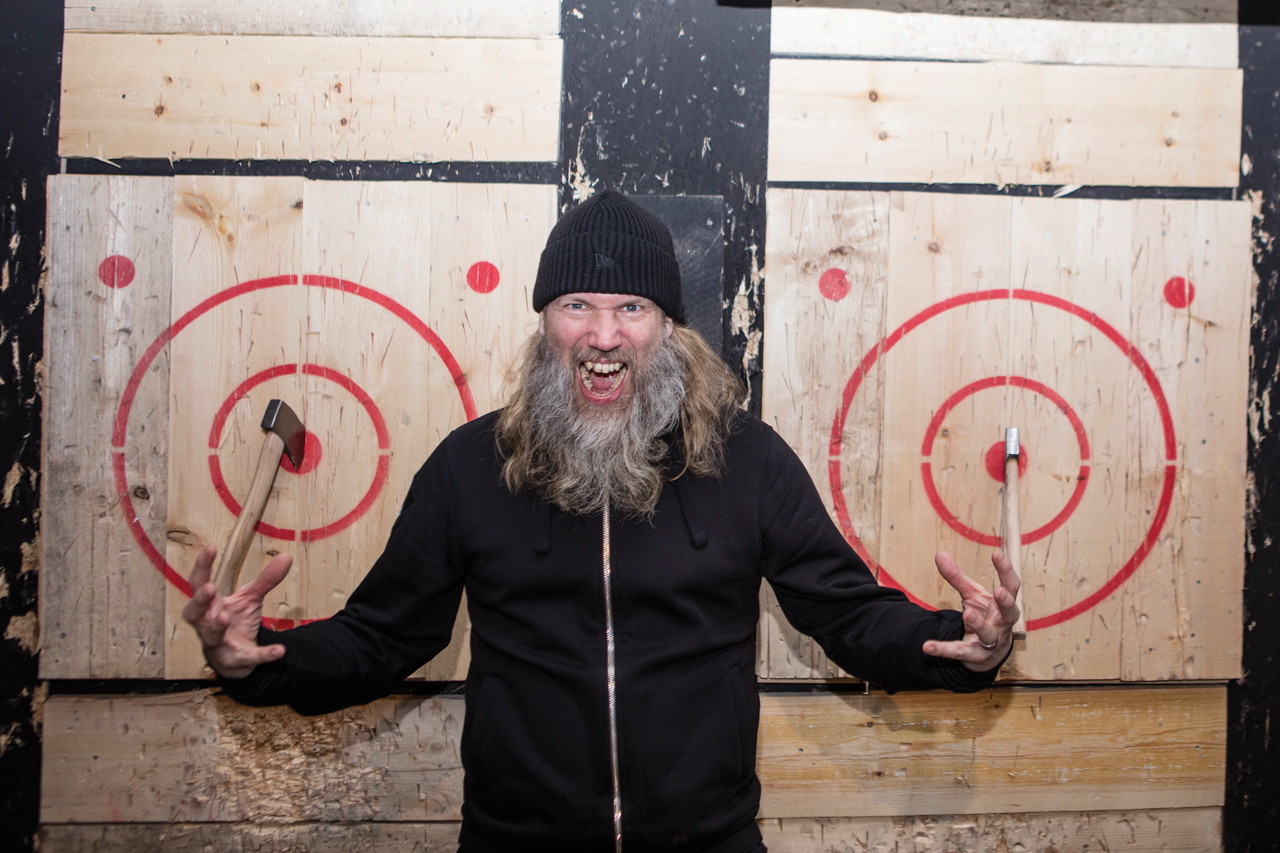
Amon Amarth’s ascent to metal’s loftier echelons defies most rational explanations. They’re a band who emerged from the febrile early-90s Swedish death metal scene to spend the next 25 years singing about rampaging Norsemen, one-eyed gods and the halls of Valhalla.
Weirdly, it’s worked for them. Each of the 10 albums they have released has been more and more successful than its predecessor, to the point where the last one, 2016’s Jomsviking, hit No.1 in Germany and even cracked the UK Top 30.
Their shows have been getting bigger and more expensive by the year: in 2017, they headlined Bloodstock and Germany’s Summer Breeze festivals within a week of each other, tooling up enough pyro in each case to lay waste to a medium-sized town and instigating a spontaneous and unofficial Epic Viking Rowing contest between the two crowds.
Amon Amarth’s 11th album, Berserker, won’t upset that upwards trajectory. It’s bigger and more anthemic than anything they’ve made before, while retaining their essential Amon Amarth-ness.
The hobnail riffs and horns-aloft choruses are custom-designed to work vast crowds up into a mass frenzy without compromising their thunderous attack: you can draw an unbroken line directly from it to their beginnings as outsiders on the Stockholm scene, not least in Johan’s ever-present growl.
Behind the scenes, too, things suggest a surge in ambition. This is the first album they’re releasing on Music For Nations, the reactivated British metal label backed with the not-unimpressive muscle of Sony Music.
They’ve got the same heavyweight management team that look after Slipknot in their corner. It all suggests a band ready to meet the world head-on like never before.
Johan Hegg has a neat phrase to encapsulate this new phase of his band’s career: Amon Amarth 2.0. Which means, in his words, “Still Amon Amarth, but another level of Amon Amarth.”
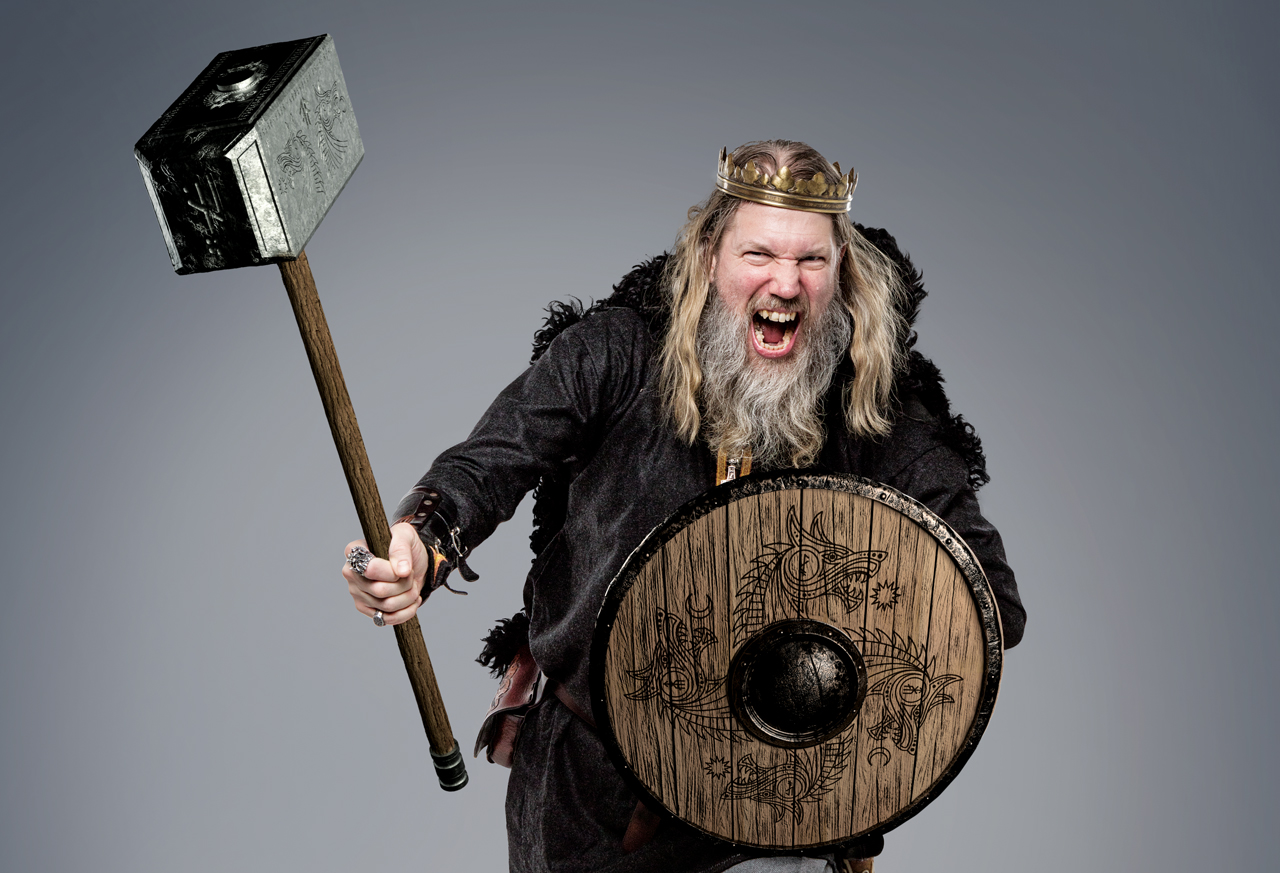
The first thing you notice about Johan when you meet him is his sheer physical presence. He’s a big man: not fat or bulky, just large and imposing and fearsome looking, with a beard that suggests somewhere a Viking village is missing a chieftain.
But then you quickly realise that, actually, he is nothing like that at all. He may be
a dab hand at lobbing an axe – at least in theory – but he’s also quietly spoken, thoughtful and funny.
When he’s not hamming it up onstage with Amon Amarth, he practises both MMA (mixed martial arts) and yoga (his wife teaches the latter).
You’re unlikely to find him chowing down on a freshly spit-roasted haunch of meat; he says he’s “mostly” vegetarian, at least off the road.
And while his wedding ceremony was a full-on medieval re-enactment, the song he proposed to his wife to was Journey’s epic soft rock ballad, Lights.
“What you see onstage is an exaggeration of who I am,” he says in word-perfect English, in an uncomfortably small booth in a riverside pub just around the corner from Whistle Punks and its axe-throwing mayhem.
“It’s not a character, like Alice Cooper, but it’s a bit of a persona. It’s an emphasised Johan Hegg up there. More theatrical, more outgoing. A little bigger.”
What isn’t emphasised or exaggerated is his love of Viking culture. What might seem like shtick to anyone only superficially acquainted with Amon Amarth is actually a deeply abiding, and oddly rational, fascination with the culture of ancient Scandinavia.
He’s heavily involved with Grimfrost, a company that makes ‘authentic’ Viking products, from beard braids and dinner plates to helmets and robes.
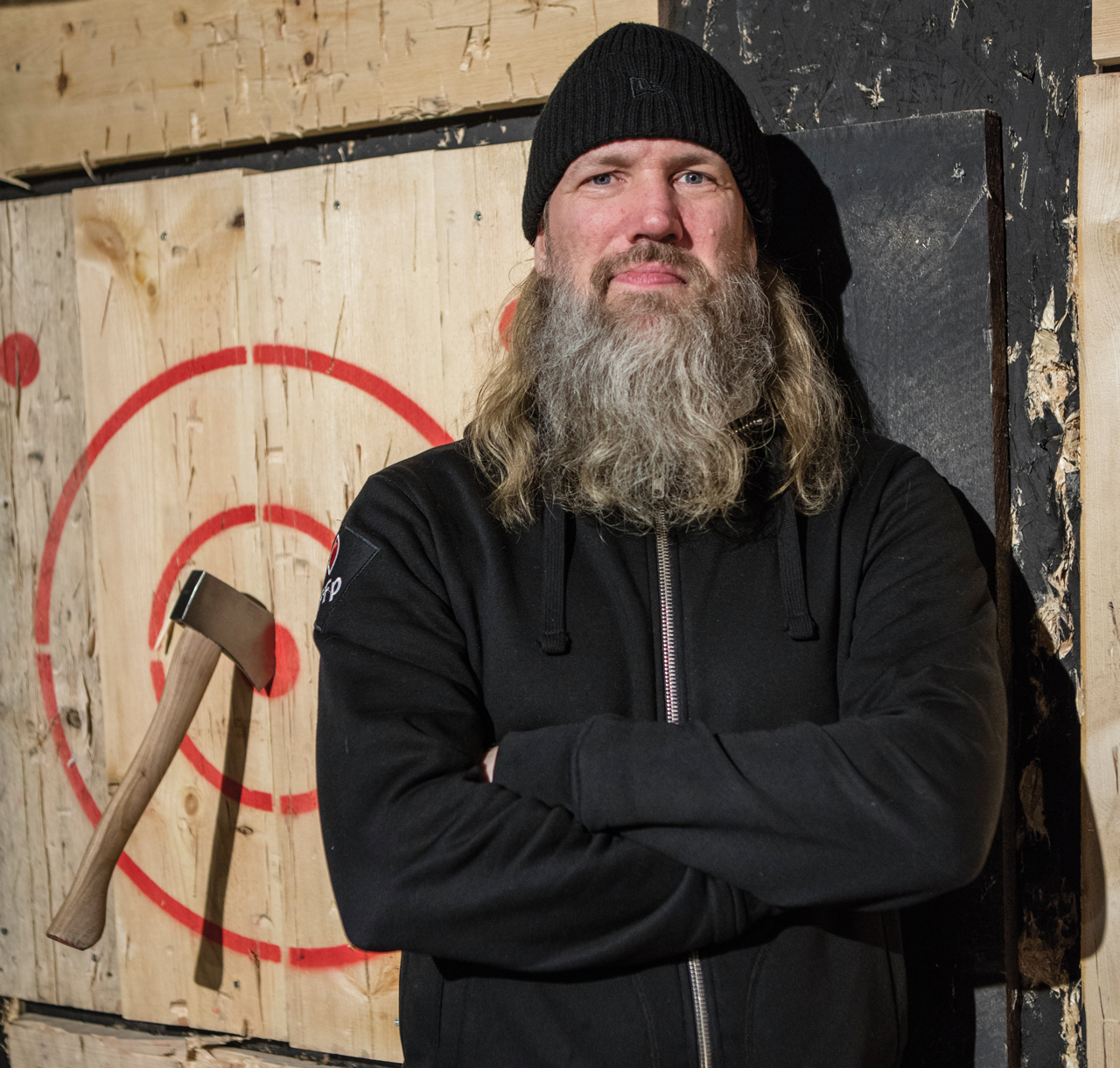
The Viking theme that runs through Amon Amarth’s music stretches back to their inception in 1992.
It started out as a combination of Johan’s fascination with that era and a way of setting them apart from what the singer describes as “a lot of bands singing about Satan”.
Today, it’s become their defining characteristic. Maybe to the point of caricature. Doesn’t that bother him?
“In some ways, yes. But I also think what I’ve tried to do is use the history and the mythology as a backdrop for the modern stuff I want to talk about. On this album, for instance, there’s a song called Into The Dark.
"It’s really about the fact that we all carry a darkness inside of us. We all do things that maybe aren’t rational,
that are counter-productive to what we want to achieve.”
And do you have that darkness inside you?
“Of course.”
How does it manifest itself?
“As a child, I had a lot of anger issues. Asan adult, I’ve carried a lot of that anger. There are things in my personality I’m not proud of. A bunch of stuff that I personally have been going through over the years.”
Such as what?
“I don’t really need to go into specifics.”
But you’ve written a song about it.
“That’s the thing. I can write a song about it without laying it all out there. But that song is about realising the way you behave sometimes that either hurts yourself or other people. It doesn’t necessarily all have to be about me. It’s about the darkness we find in ourselves sometimes, that we often forget that we carry around.”
You rapidly find that this is the most frustrating thing about Johan Hegg. The Norse marauder front is hugely entertaining, but it’s hard to work out what’s really going on behind the beard – and something clearly is going on. He’s just not saying what it is.
“There’s a reason why we crave stories and books, movies, theatre, whatever,” he says. “And the reason is that through stories we can discuss really difficult topics without actually pushing all the buttons.”
So would Amon Amarth ever release a Viking-free album?
“Maybe,” he says, smiling. “We have kind of painted ourselves into a corner.”
He’s joking. Or at least half-joking. Or perhaps he isn’t joking at all and simply doesn’t give a damn.
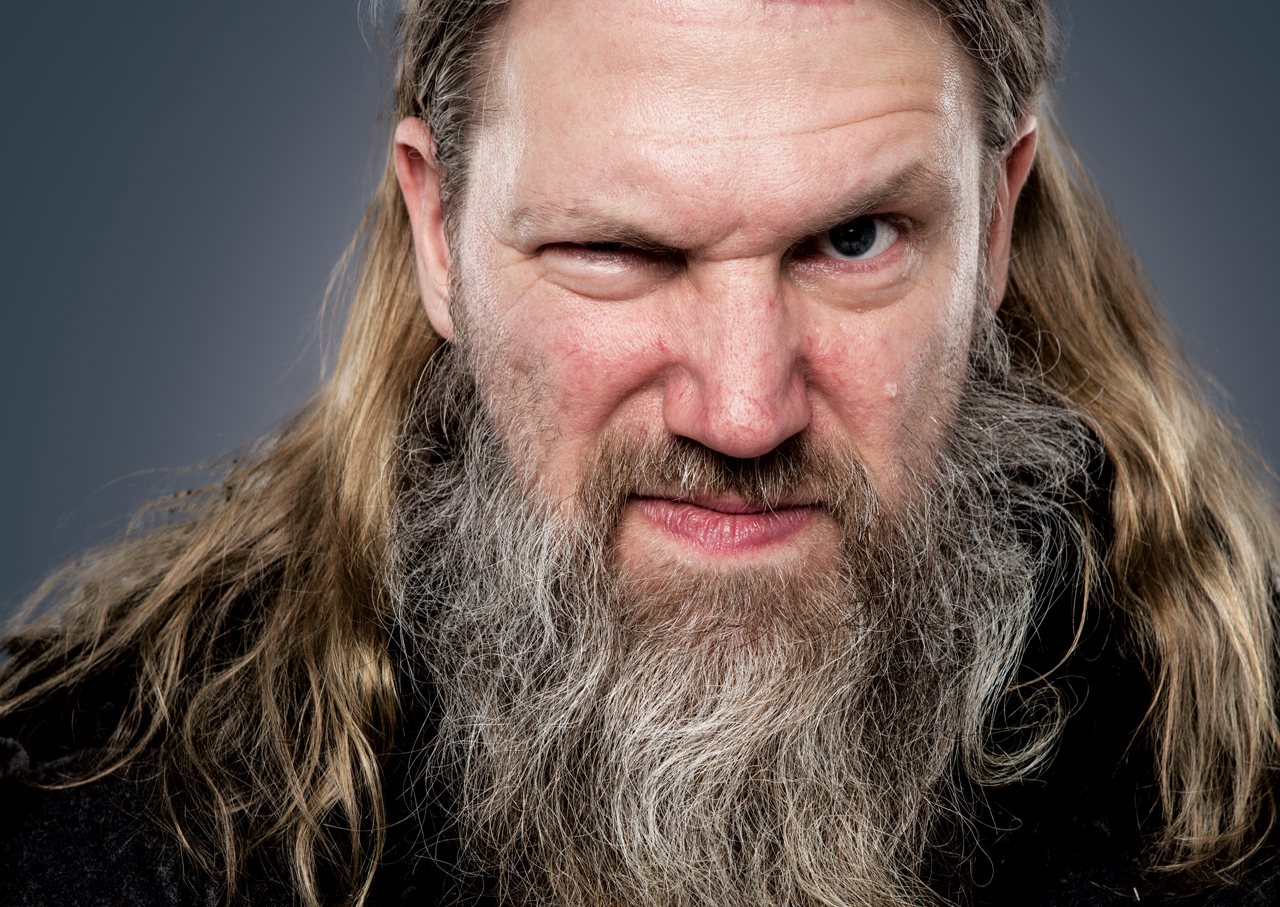
Meanwhile, back at the axe range, things are hotting up, at least for one of us. The first of our three head-to-head battles isn’t going so well for Hammer.
The Viking blood coursing through Johan’s veins is working its ancient magic. Each axe he throws sails through the air towards the target, its trajectory as true as… well, an axe being thrown by a large beardy bloke from Sweden.
In Hammer’s defence, Johan does have an advantage. He’s done this before, and not just with the piffling little hand axes we’re chucking today.
No, he’s lobbed a full-on twin-bladed axe before, a properly hefty mini-weapon of mass destruction with two dangerously sharpened pieces of metal sticking out of either side of its business end. “You have to be very careful when you’re lifting that one over your back,” he says.
And that’s not all. He even considered building a proper axe-throwing range just
like this one in his backyard. “But I have a cat,” he says, shaking his head. “It could
have been messy.”
Hammer’s protestations that such advantages give Johan a headstart and he should be penalised by having at least one hand chopped off, or at least a few points docked to start with, fall on deaf ears.
The result of this first bout is predictable: Johan takes it. There’s a song on Berserker called The Berserker At Stamford Bridge, about an 11th-century battle that took place in what would become Yorkshire between the English king Harold Godwinson and an encroaching Viking army.
Remarkably, the English defenders defeated these rampaging hordes and, according to historians (or Wikipedia, anyway), put an end to the Viking age.
Right now, it feels like Vikings are having their revenge.
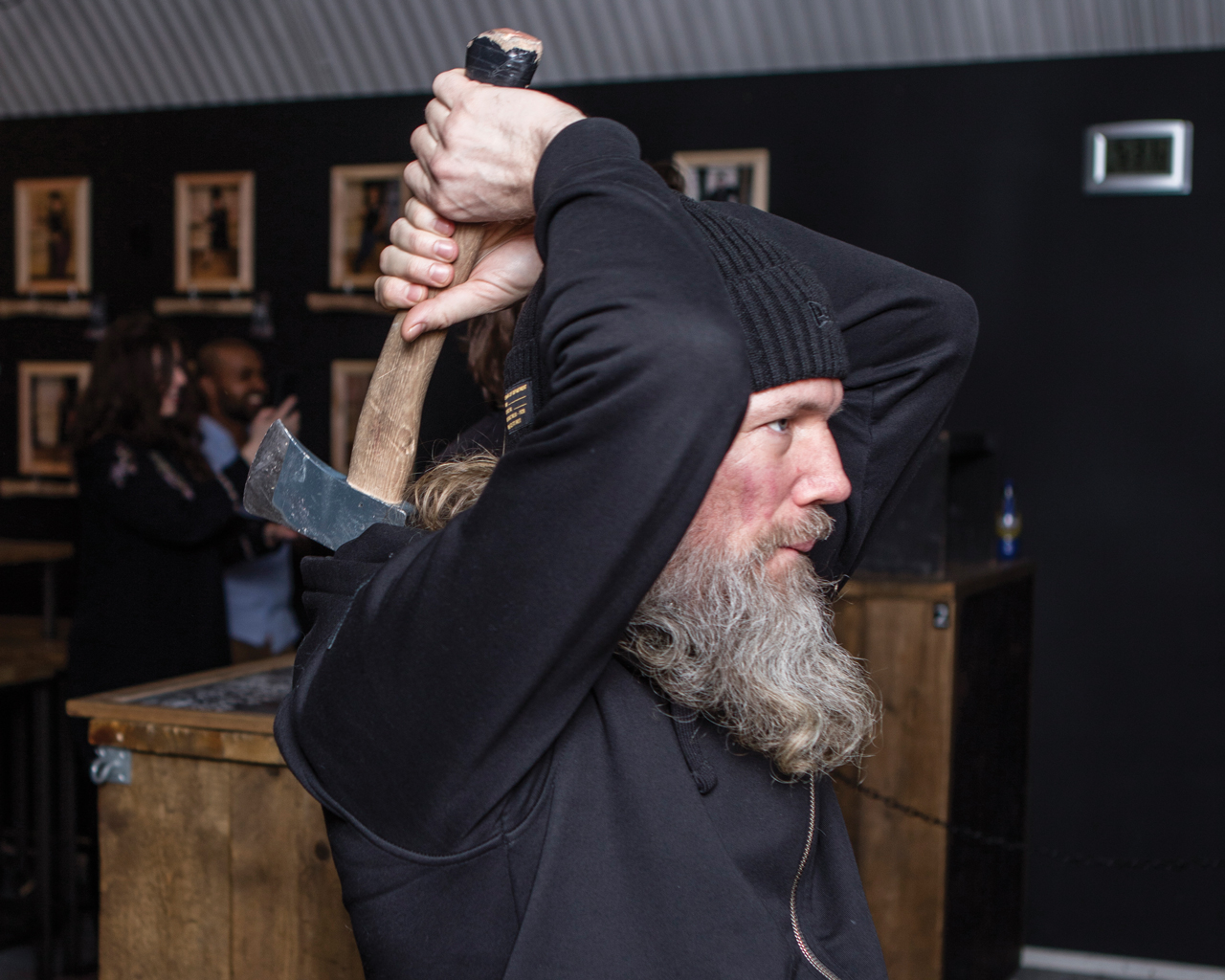
It hasn’t always been smooth sailing for Amon Amarth. They started out as a bunch of death metal kids in the far-flung Stockholm suburb of Tumba. They knew the prime movers from the local scene but they were never ushered into the inner circle.
“I’m not going to say that we felt like outsiders, but we didn’t really feel like we were part of it either,” says Johan, in the riverside pub.
“We were a bit too late to be part of the movement that started with Entombed and Dismember and those bands. And by that time, the Gothenburg scene was becoming dominant, and we were too far away from there to be part of that one.”
What it did do was force Amon Amarth to find their own thing: that ‘thing’ being the Viking theme that would come to define their career.
There were concerns: that kind of celebration of cultural heritage carried a nasty whiff of extreme nationalism and white supremacy, thanks in part to the antics of some of the more swivel-eyed members in neighbouring Norway’s black metal scene.
“No, no, no, we wanted nothing to do with that,” says Johan. “That wasn’t why were doing this. I was fascinated with the historical and cultural parts of Viking society and how it reflected modern society.”
Amon Amarth’s early ambitions were small and achievable rather than grand and overblown: play a gig, record a demo, get signed to a label, get signed to a bigger label.
“There was no plan,” says Johan. “From the start I was doing this because it was fucking fun. It was great just writing these awesome songs, hanging out with friends, getting shit-faced.”
Johan held down a succession of day jobs during the band’s early days. He worked as
a butcher at one point. At another point he was a salesmen, selling cheese for
a supermarket. “I was the best cheese salesman there,” he says proudly.
What was your secret?
“I was just good at convincing people to buy cheese,” he says, like it’s the stupidest question he’s ever been asked.
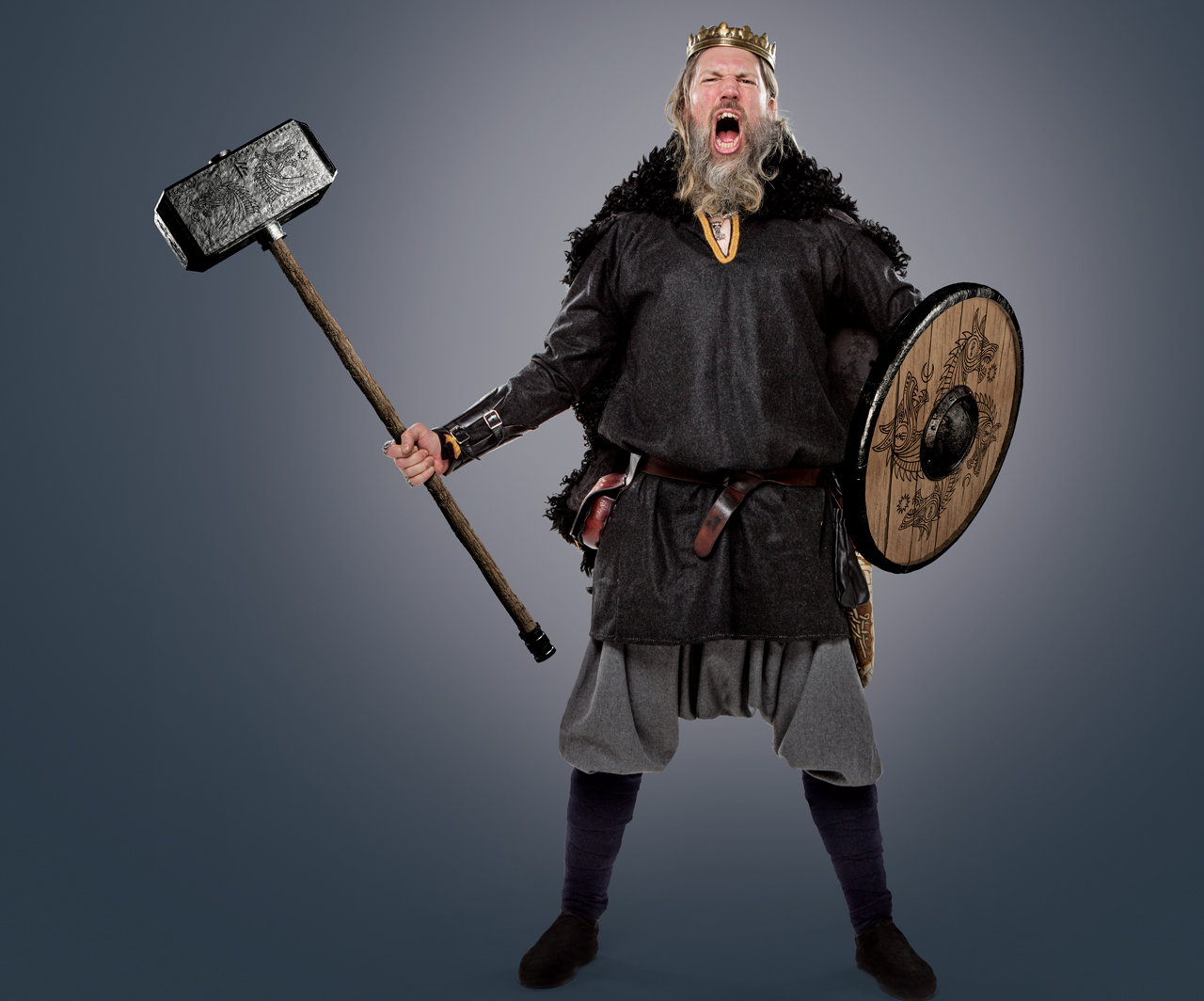
Two things happened around the same time that knocked the wind of out his sails. Firstly he lost his job as a cheese salesman (don’t laugh). Then the wheels started to
come off Amon Amarth.
The band’s first three albums had all done well, but none had broken through.
Johan and his bandmates were becoming disillusioned with it all. They were stuck
in a rut. If people weren’t listening, what was the point in continuing?
“It was very serious,” he says. “We’d even planned it out. All the songs on our new
album were about the end of the world. So was the cover, everything. It was, ‘This
is it, we’re done, thank you, goodbye.’”
Amon Amarth were truly ready to hang up their shields and swords when they got
an invite to play Germany’s legendary Wacken festival.
‘Why not?’ they figured. ‘It’s a cool way to go out.’ They were on in the middle of the afternoon, low down the bill, so they had nothing to lose. They played a brand new song, Death In Fire. The entire crowd went bananas.
“We were, like, ‘Wait a minute, there’s something here,’” recalls Johan. “And we thought, ‘Maybe we should have another whack at it.’ I felt so relieved.”
They swapped the cover, changing the image from one of defeat to defiance, and released the album, Versus The World, in 2002 – a title that could have been the band’s motto ever since.
Subsequent albums and attendant live shows have repositioned Amon Amarth as one of modern metal’s biggest draws. Except there’s nothing really modern about them.
They’re part of a trad-metal lineage that stretches back to the dawn of the genre, far away from the next-gen stylings of Parkway Drive or Code Orange or Deafheaven or any of the other bands taking metal forwards.
“We’re not modern,” says Johan evenly. “We’ve never we tried to do that, it wouldn’t
be genuine. We’ve always strived to do what we like. Those bands are who they are, just as we are who are we are. If we tried to be a modern metal band, it wouldn’t be genuine. So why would we?”
It’s hard to argue with that point.
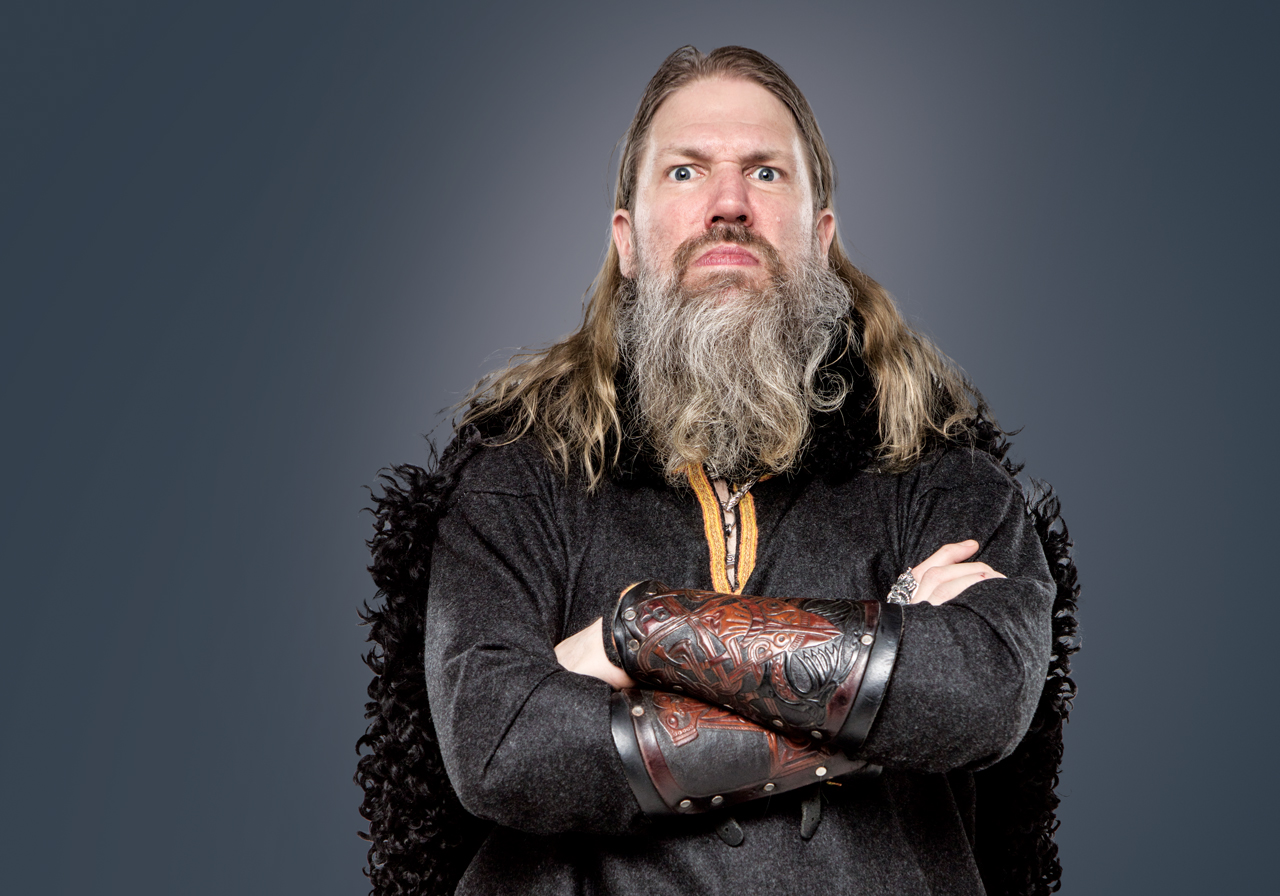
Back at the axe-throwing range, and it’s seconds out, round two.
Johan’s previous experience is undoubtedly coming in handy. He gets off to
a ripping start, hitting the target four times out of five. But he’s not managed a bullseye this time, instead making the outer rings for fewer points.
Worryingly for him, Hammer is starting to find its groove. All five of the axes we launch from increasingly steady hands – admittedly still in hope more than expectation – end up not just hitting the target but bifurcating it perfectly, handles jutting out at proud angles.
Our Swedish friend is starting to look disgruntled and not a little concerned. We’re not saying it would be embarrassing for such an experienced chopper-botherer to lose to someone who’s never thrown so much as a butter knife before, but… well, it would be embarrassing. Really embarrassing.
Hammer doesn’t quite steal the victory: a peculiar and wholly unfair points system means it’s a draw. But things are starting to swing back our way. The scent of blood is in our nostrils. The game, as they say in ‘the sports’, is on.
When you pause to think about it, Amon Amarth’s success is remarkable. They may have toned down their more brutal edges over the years, but they’re still a fearsomely full-blooded and uncompromising proposition.
And they certainly haven’t dialled down what, in terrible management consultant-speak, would be called their ‘core brand values’: i.e., singing songs about Vikings at maximum volume.
Of course, the flipside to all that is that you know exactly what you’re getting from Amon Amarth.
The themes might be tweaked from album to album and the dates of the battles they’re singing about might be different, but this most larger-than-life band are sometimes guilty of playing it safe. Does Johan agree? He thinks about it for a few seconds.
“Yes. I think so.”
Really? You don’t seem that bothered.
“I mean, in a way we are. If we wanted to, we could step out of the comfort zone. We could definitely write about something else. But I’d say that it’s partly giving our fans what they expect, and it’s partly writing about something I feel I know about and care about.”
True. You know what you’re getting with Amon Amarth: songs about Vikings and
a killer live show. But that’s the point. Is there any more to you than that?
“I think musically we’re brilliant and we put on great shows. But there is depth to the lyrics if you look for it. And if you’re not looking for it, fine, these are great stories. Like Iron Maiden. They’re diverse in their lyrics.”
Are Amon Amarth as good as Maiden?
“I don’t think so.”
So how good are you?
“We’re brilliant. But Iron Maiden are genius. I’ll say this, though, I think we’re on our way to being a band that can pick up the mantle one day, when Iron Maiden retire. Which I know they won’t. But if they do, we’re ready.”
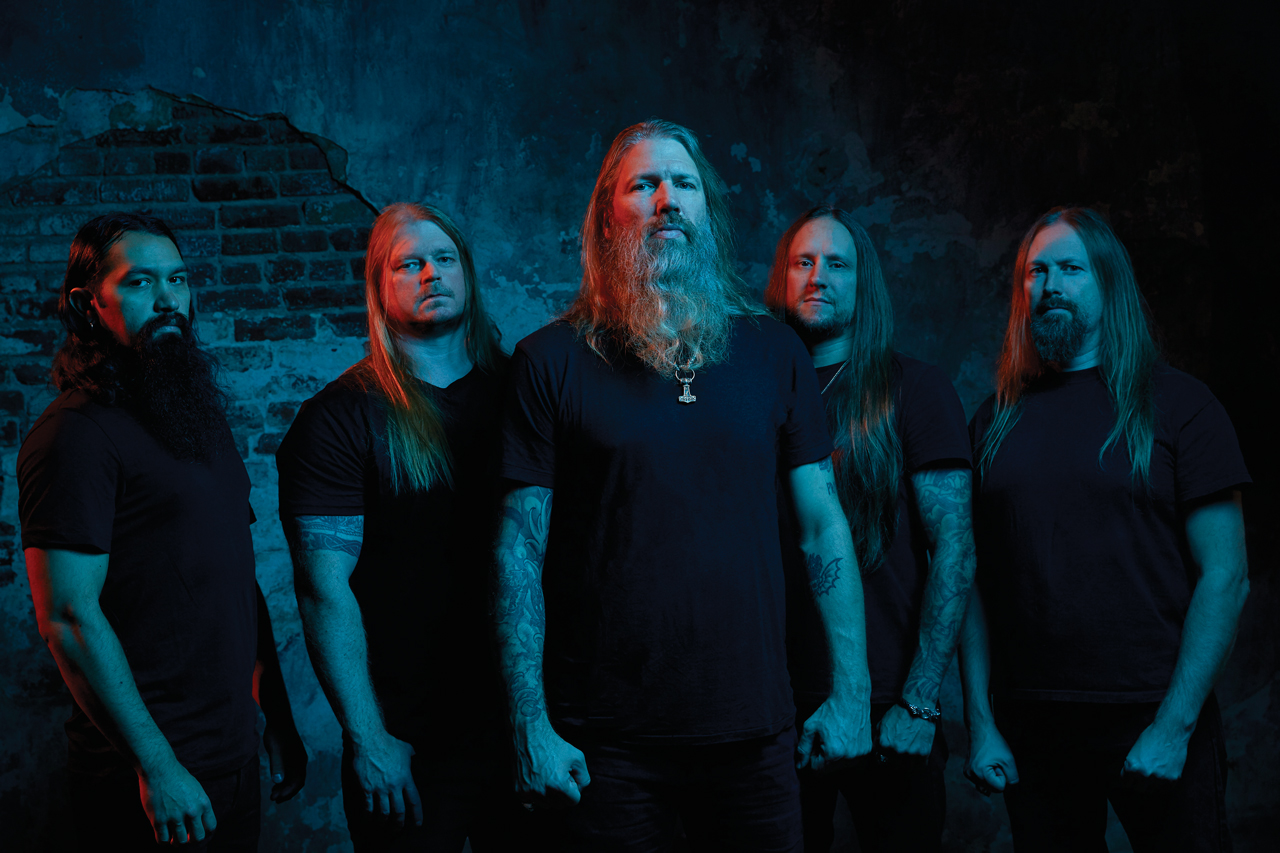
Back at the axe range, things aren’t looking so rosy. The lifetime of practice Johan Hegg has put in so far in preparation for this very moment appears to have been wasted.
Spoiler alert: the Viking is about to have his hairy arse handed to him on a pillaged silver plate, with a side order of hog’s offal and a jug of mead to go.
We’re reaching the last of our three bouts. Johan throws his chopper. It arcs through
the air and caresses the target like a long-lost lover. Then it bounces straight back off and falls apologetically to the ground.
Throw two isn’t much better. In fact it’s even worse. The flat of the axe head hits the target, rather than the business end, and the same thing happens. This is getting embarrassing for the plucky Norseman.
Throw numbers three through five are hit and miss – specifically, more miss than hit.
He makes the bullseye once, but that’s all. “Damn,” he snarls, and suddenly the centuries fall away and you can see the narked Viking warrior in him.
By contrast, Metal Hammer’s axes are finding their target every time. OK, there’s
the odd fluff, but mostly they’re slicing satisfyingly into the distressed wooden boards.
Thunk. Thunk. Thunk. Clatter. Thunk. It’s pure beginner’s luck, of course. But frankly, when you’re facing down an increasingly annoyed Norseman with a potentially lethal weapon in his hand, you take any luck you can get.
And then it’s done. Metal Hammer has 23 points to Johan’s 21. It’s like The Battle Of Stamford Bridge all over again.
Johan doesn’t look happy. In Berserker, Amon Amarth may have made an album that will see them stepping up to the next level, but right now that’s just a sticking plaster to cover up injured pride.
“Next time, I get to pick the sport,” he growls. And what would that be?
“MMA.”
There’s nothing worse than a bad loser. Especially a Viking one.
Dave Everley has been writing about and occasionally humming along to music since the early 90s. During that time, he has been Deputy Editor on Kerrang! and Classic Rock, Associate Editor on Q magazine and staff writer/tea boy on Raw, not necessarily in that order. He has written for Metal Hammer, Louder, Prog, the Observer, Select, Mojo, the Evening Standard and the totally legendary Ultrakill. He is still waiting for Billy Gibbons to send him a bottle of hot sauce he was promised several years ago.

